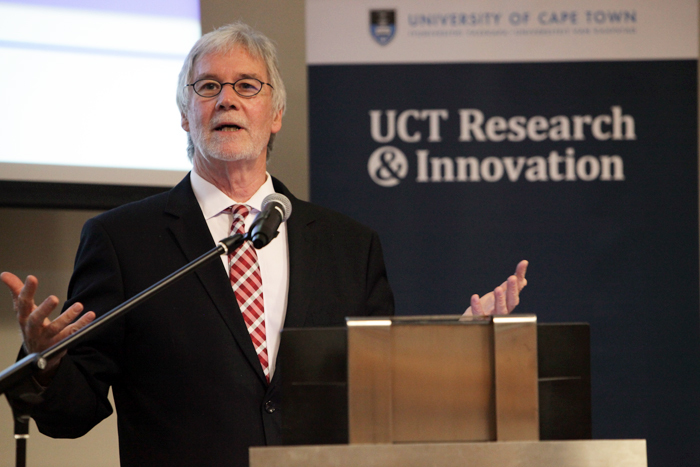UCT researchers help shape sustainable development goals
16 November 2016 | Story by Newsroom
UCT should not only be the best university in Africa but the best for Africa. This was the message from Deputy Vice-Chancellor for Research and Internationalisation, Professor Danie Visser, at the 2016 research function and launch of Research & Innovation 2015-16. It is with this goal in mind that this year's report focused on the important work UCT's researchers are doing to further the United Nations (UN) sustainable development goals (SDGs).
Adopted in September 2015, the SDGs replaced the millennium development goals (MDGs), whose remit ended in that year. The SDGs were developed as a result of a wide-ranging negotiation and consultation process between 193 countries and a host of stakeholders – a process UN Secretary General Ban Ki-moon called the “most transparent and inclusive process in UN history”. The result is 17 far-reaching goals that set out to tackle a range of issues, from gender equality to climate change.
“It is striking to see how closely the SDGs speak to the critical problems for South Africa and the continent, and reassuring to see how closely they match the strategic priorities of research at UCT,” says Vice Chancellor, Dr Max Price. “It is therefore no coincidence that UCT researchers were among the world-leading academics who were involved in the lobbying for and drafting of the goals.”
Professor Haroon Bhorat, director of the Development Policy Research Unit in the School of Economics, served as head of research for the High-Level Panel appointed by Ban to deliver a proposed SDG agenda to the UN General Assembly. Members of the African Centre for Cities (ACC) participated in a global campaign to ensure that sustainable cities were explicitly included in the SDGs. Similarly, Professor Crick Lund was one of the leaders in the field of global mental health – #FundaMentalSDG – who lobbied to have mental health included.
This involvement of academics in the drafting of the SDGs has meant that the global research community is better placed to contribute to their implementation. And there is a wide acceptance that they must do so if the SDGs are to succeed.
The SDGs are not perfect, and many of our researchers are the first to point this out. However this is another key role they have to play: providing an independent and critical voice to ensure, not only that the goals are realised as closely as possible, but that their complexity is not lost in translation. Transforming Our World: The 2030 Agenda for Sustainable Development recognises the interconnectedness of the goals, and the increasingly interdisciplinary focus of much research at UCT means that it is well placed to play its part in finding solutions for a more sustainable world.
“UCT must strive to be a brilliant example of a university in the developing world, which means that it must both contribute to answering the big science questions, and respond meaningfully to solving the problems that face the country and region,” says Visser.
Research & Innovation 2015-16 showcases the breadth and depth of the work researchers at UCT have done, and are doing, to address the challenges around the SDGs.
 This work is licensed under a Creative Commons Attribution-NoDerivatives 4.0 International License.
This work is licensed under a Creative Commons Attribution-NoDerivatives 4.0 International License.
Please view the republishing articles page for more information.











